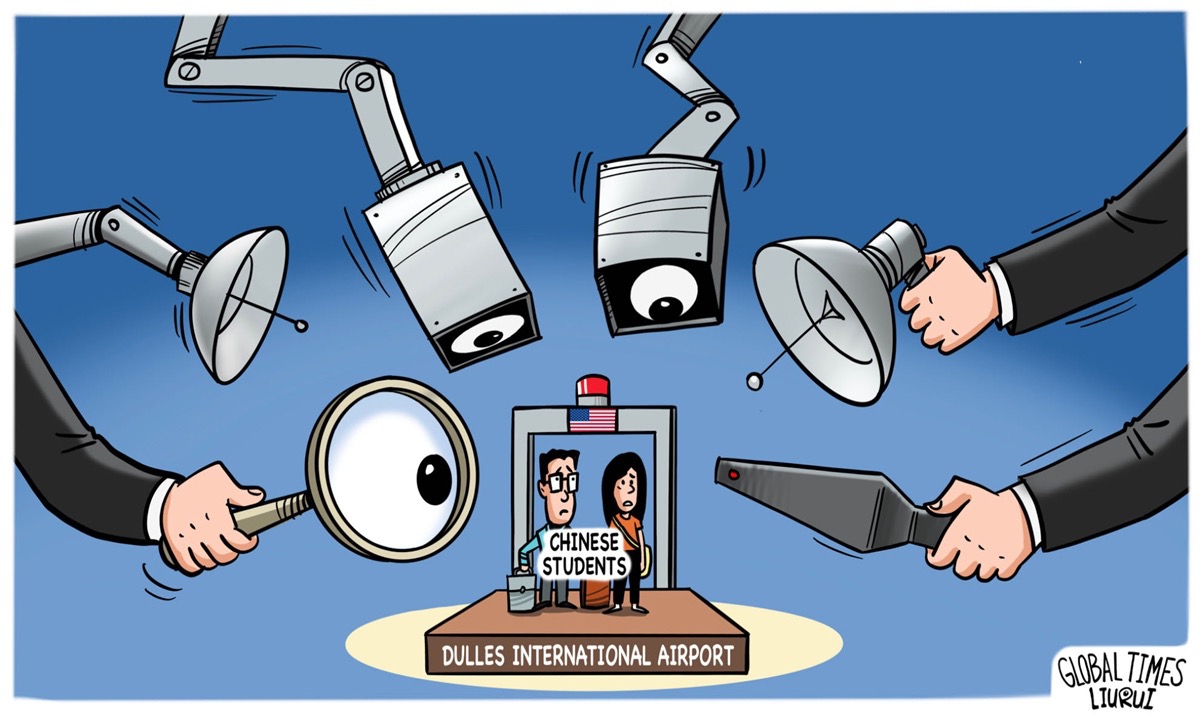
Illustration: Liu Rui/GT
For some time, the US has been interfering in normal educational and academic exchanges between China and the US under the pretext of "national security," subjecting Chinese scholars and students to intrusive questioning, and even arrests and prosecutions on fabricated charges, with the situation escalating progressively.
Three recent cases have raised public concern over such practices. In the first, a Chinese scholar traveling to the US for postdoctoral research was taken into a "secondary inspection room" at the airport by US Customs and Border Protection (CBP) officers upon arrival. His phone and computer messages were seized and examined. He then faced intense questioning about whether he was involved in research projects funded by the Chinese government. Ultimately, the US authorities insisted on canceling his visa, barring his entry and sending him back to China.
In the second case, a Chinese student already enrolled in a US master's program in computer science was denied re-entry after returning from a vacation. US officials interrogated him in detail about his academic background and whether his field of study had any military applications, citing "immigrant intent" as the reason. Eventually, they refused him entry, and sent him back to China.
In the third case, a Chinese student pursuing a PhD in electronic engineering in the US was denied entry upon returning to the country. After a lengthy interrogation regarding sensitive issues such as the focus of his research and whether he is a member of the Communist Party of China, US officials even used provocative language toward the student, displaying extreme rudeness.
President Donald Trump has repeatedly stated publicly that he welcomes Chinese students to study in the US. Logically, the US side should correct its past unfair treatment of Chinese students and scholars, and put such welcoming statements into practice. However, the reality is quite the opposite: Certain forces within the US government are obstinately continuing, and even escalating, discriminatory measures against Chinese students.
From the perspective of major-power responsibility and responsible diplomacy, such actions - breaking promises while profiting from them - are pushing the US further away from being an "effective actor." It must be emphasized that while the Chinese government and people have always valued cultural and people-to-people exchanges between China and the US, this in no way means tolerating or condoning such malicious acts of unwarranted suppression and restriction against Chinese personnel. For every such case, the Chinese government has lodged solemn representations with the US side promptly, and will never stand by while the lawful rights and interests of its citizens are violated.
Educational cooperation and academic exchanges are among the most fundamental and vital bonds in China-US relations, carrying the important mission of enhancing mutual understanding and trust between the two peoples. As a global center for higher education and scientific research, the US has long benefited greatly from people-to-people exchanges with China, attracting a large number of outstanding talents, including many from China. However, even the richest academic resources cannot withstand the waste caused by unwarranted political manipulation and discriminatory law enforcement. Such actions by the US not only do nothing to advance its own development, but also undermine its global academic leadership and damage its image as a country governed by the rule of law. China-US relations must urgently return to the right track of normal exchange and cooperation, abandon such politically motivated disruptions, and rebuild mutual trust through an open and inclusive academic environment - thereby promoting common progress and bringing benefits to both countries and the world at large.
China has consistently advocated promoting exchanges and cooperation between the two countries in education, culture and other fields, and safeguarding normal people-to-people interactions. Such cooperation, however, must be based on equality, mutual benefit and win-win outcomes, with both sides meeting each other halfway. China urges the US to earnestly implement the important consensus reached by the two heads of state, manage differences, expand cooperation, and restore the positive role of educational and academic exchanges as a key bond - continuously injecting positive momentum into the stable development of China-US relations.
